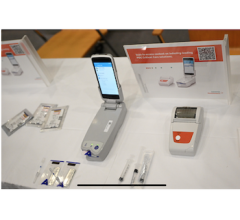
February 12, 2019 — Cambridge Consultants has partnered with Exact Imaging, makers of the ExactVu micro-ultrasound platform, as the two companies work to improve the way prostate cancer is visualized and detected. Cambridge Consultants is applying deep learning to high-resolution micro-ultrasound imaging to identify potential suspicious regions of tissue and inform urologists who may want to consider this additional data in their biopsy protocol. Early results show real promise, according to the companies.
Prostate cancer is the second most common cause of cancer death in men in both the U.S. and the U.K. The current standard-of-care ultrasound, which guides prostatic needle biopsies that help to diagnose prostate cancer, yields a 30 percent false negative rate as the resolution of the ultrasound systems is insufficient to differentiate suspicious regions. As such, the prostate biopsies are usually delivered in a systematic, “blind” pattern. 1
The ExactVu micro-ultrasound platform is an imaging tool to allow urologists to harness micro-ultrasound’s near microscopic resolution in order to visualize suspicious regions and actually target their biopsies to those regions. Operating at 29 MHz, the micro-ultrasound provides a 300 percent improvement in resolution over conventional ultrasound.
Cambridge Consultants aims to use higher resolution micro-ultrasound images from the ExactVu platform in combination with cutting-edge artificial intelligence (AI) techniques to provide new information to urologists to help them to improve their targeting of prostate biopsies. With their AI tools being able to interrogate the full ultrasound data set when correlated to pathology, the analysis should deliver improved accuracy and better characterization of suspicious regions. The machine learning approach being applied is faster and less computationally intensive than traditional statistical approaches and may ultimately form the backbone of a commercially-viable software application. Early results from proof of concept testing show significant promise, even with relatively limited data sets.
The current work on prostate cancer is the latest output from Cambridge Consultants’ Digital Greenhouse 2, an experimental environment where data scientists and engineers explore and develop machine learning and deep learning techniques. Digital Greenhouse 2 aims to ensure that deep learning is potent beyond the huge online datasets that have powered advances to date. Recent work has focused on applying deep learning in areas where massive datasets are unavailable. In the case of its work on prostate cancer, data was available for hundreds of patients.
For more information: www.cambridgeconsultants.com, www.exactimaging.com


 February 06, 2026
February 06, 2026 









